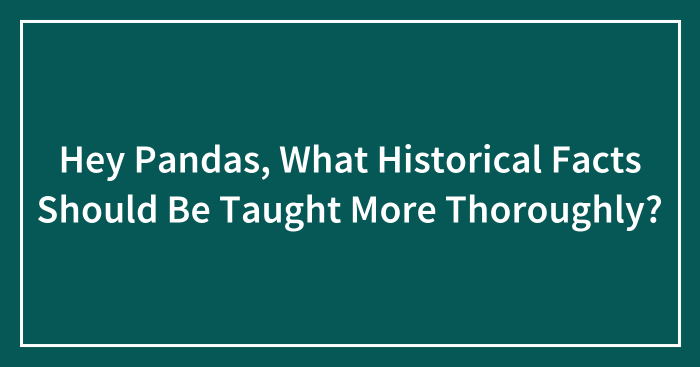With centuries of history to teach and only about a decade to teach it, of course, schools cannot teach students every part of history in depth. Some students are surprised to find what their schools skipped. What topic in history would you have prioritized?
This post may include affiliate links.
This might be a bit controversial, but the history of religion. In sixth grade one of my teachers did something like this for Halloween, and it was one of my most interesting lessons ever in school. I get that schools don't want religion interfering with school, but I feel like teaching the concepts of different religions and how they came to be could really benefit kids when interacting with people of a different religion.
yet, when religion is taught, teachers aren't equipped with the right education to respect all religious beliefs, often leading to an internal and external struggle between 'which religion is better'. it's quite difficult for a hindu teacher to teach how christ was born to a virgin, or for a muslim teacher to explain how hindus believe in lakhs of gods. until we all are equipped with the right mentality to learn, i don't think we'll be ready to teach
The difference between socialism and communism. What is a social democracy and how does it work. But also: forms of government: Autocracy
Oligarchy, Parliamentary democracy, Constitutional Democracy, Dictatorship,
Military dictatorship, Theocracy, to name a few. How can a democracy turn into a dictatorship.
I feel that the details of subjects like slavery in the Americas and the Holocaust were glossed over. The textbook and curriculum focused more on names and dates than on the human aspect. The full horror of those events is beyond the scope of what can be taught in a classroom, but students should at the least be encouraged to think of it as the suffering of real, living, breathing people, not just facts and figures.
I think teaching about slavery should be more prevalent, given I got to 30yrs old before I learnt about Kanankas who worked in Australia. The holocaust for us was talked about in depth, as we studied Schindler's List, so we looked at all the ethics of that. Then in Uni we studied The boy in the striped Pyjamas (my sister learnt about it in yr 7 too).
Any fact is nice. A fact by itself is trivia, not history.
But what is the impact of the fact? What did it change? Why did it happen? Who was involved? Why do people argue about it, and what are the conflicting views? Are there other facts that are in conflict with the original fact? What are misconceptions about that fact?
YES!! THIS!! Prioritise UNDERSTANDING not MEMORISATION. These, antithese, synthese! You have my most emphatic upvote, good sir Kaine!
Native American History in America. Most history classes start with the arrival of the European la as our history, but we should be aware of who and what came before that. We need to be aware that we were not the first ones here.
THIS! All of this! Every year I am in history, all I want to learn about is how were Native Americans like before European settlement, but instead we get a WHOLE FRIGGIN UNIT on Andrew Jackson, 'cause he's clearly more important than thousands of years of history, right?
Prehistoric fact not hsitorical but still important. Most modern research shows that stone age people lived in very egalitarian societies with no classism and barely any separation of gender roles. People still have the idea of prehistoric men as brutes that were the providers, hunters and leaders of the group. With women being simply mothers that needed to be fed and protected. But it is very clear by now that women had a very important role in their society; they hunted, theybgathwred (and plants were more oftne than not the main food), they created art, they were shamans and leaders, artisans, tool makers.
There is nothing in our past or biology that justifies sexism. Nothing inherent or biological in the ideas that we have about masculinity and femininity.
It was a society based on contribution for the good of the group..group hunts, gathering and sharing food and skills.
Vikings did NOT wear horned helmets! As a norwegian-american I can tell you it bothers me sooooo much whenever I watch a documentary in school or something about viking and I see those things. I don't know why it bothers me so much, it just does-
Middle Ages. The current concept of the middle ages that people teach nowadays is archaic (people from that era=dumb, prejudiced people with silly ideas).
As someone who once got in trouble for adding an interesting factoid to a subject we were covering in History. Let's just say we stop glossing over and whitewashing history and tell the actual facts? Like how gay the Greeks and Romans were, how HORRIBLE black chattel slavery was compared to say Roman slavery. The Irish Slaves of America. What Eugenics is and it's roots in racism. Why communism isn't the problem, neither is capitalism, it's the people running the s**t-show. I could go on but this is getting long and ranty.
No worries. I posit that black slavery, having existed only a short while (despite that being a substantial portion of the USA's lifespan as a nation) compared to that of for instance China (the Great Wall is as old as the USA itself, built by slaves worked to death, and filled with the bodies of their dead), or Egypt (finishing work was artisans, but the bulk of logistics was slave-powered and spanned millennia). The early americans were religious zealots that refused to stop persecuting on the basis of faith and were evicted from england as a result. The fact this is taught in american schools as "freedom from religious persecution" is VERY telling. I take it feudal europe and the patricians that built it are outside your purview? You can call it whitewashing if you enjoy the thought, but until VERY recently, the european notion of darkskinned was Spaniard, because africans simply didn't exist in europe.
Ancient Greeks had vending machines. 12 th century had fully functioning automatons that could play music centuries before Leonardo. Tesla was awesome we lost years thanks to Edison and his goons
We lost a lot of history and technology because of the church. Anything that drew attention and money away from the church was condemned. Knowledge was destroyed, or hidden. And educating women was usually against the law. Religions have long lists of what NOT to do. Even that movie based on Carl Sagan's view of space hinged on a lame religious question/affiliation. Separate church and state and there will be massive leaps forward in education and quality of life.
All of them. Every history book I see from the schools is full of misinformation or outright lies. Especially American history. Haven't seen a schoolbook yet that teaches about the US's attempt to commit genocide during the "Indian Wars". Or the fact that there are still "dissident camps"- like the ones Japanese-Americans were forced into after Pearl Harbor-all over the country. Stop trying to cover the dirt in glory, and teach the actual history. The students can handle it.
The reason for teaching history is to learn from past mistakes in order to prevent repeating them. How can we prevent the mistakes from happening again if we don't know the truth? The US Government is not that different from communist countries that teach their children only communism. Our government is so worried about covering stuff up because they "can't be wrong".
The 20th century was basically filled with genocides. Starting with Armenia and going through the Holocaust, to Cambodia, Yugoslavia, Rowanda. This needs to be taught about.
Pretty much any fact, that isn't in the field of politics or war.
I live in a city, that got pretty rich by trading with salt.
How did the babylonians water their crops? I have no idea who invented the telegraph. What was the first mention able music festival?
I hate how much of history is based on war instead of on human achievement
The story of Texas. Mexicans invited Americans in, Texans came, but insisted on bringing slaves. When Mexico decided to make slavery illegal, Texans got all upset. While not the only reason Texas decided to rebel, it was one of the top three, if not the top two. (Texas also closer to New Orleans than other Mexican ports, so they wanted to trade with the US). Texas rebelled, got their ass kicked by Santa Anna, Santa Anna got complacent and split his army into three parts, Texans managed to defeat the smaller armies before they could rejoin. Texas eventually joined the US, where slavery was legal still. Twenty years later, the Civil war happened and slavery finally became illegal in Texas.
Note Texas always remembers how they had immigrated to Mexico and then stole the land. So they fear Mexicans immigrating to Texas and stealing it back.
as a Texan, this is something that infuriates me about our history. WE HAVE WHOLE YEARS LEARNING ABOUT OUR HISTORY STOP ONLY TALKING ABOUT THE ALAMO AND START TALKING ABOUT THE REST OF OUR HISTORY.
When I was going to primary school history was all about death and numbers. How long wars lasted, how many died, how many horses tanks airplanes ect. It wasn't until I was in my thirties that I started learning about the living in history on my own. How they traveled, how they cooked, what they wore and how they communicated with each other. This should be the history tought to the young, not just death but life.
Vaccine history and pandemic history. The amount of antivaxxers and Karens walking around is terrible and people need to be so much more well informed.
Anything to do with the history of America and why some things were never taught! Why take the land of the Native Americans and kill then move them somewhere else? Why slavery when there were plenty of other people already here to do the work? Why, glaze over the dedication of the government to not tell us the truth about things like aliens snd governmental spending… the list is endless.
A lot of people we learn about in school were actually gay and no one talks about it... I don't care if its contraversial, it should be more common knowledge that gay people (and other members of the LGBTQ+ community) have been around for WAY longer than the 1960s.
I recently discovered that many historians consider Ceasar took part in a homosexual relationship with the king of Bithynia in his youth. It was perfectly acceptable under greek social rules, but shameful to the Romans and he was mocked for it later in life. St Paul is another figure who is regarded by some as having had a homosexual romance, if never actually engaging homosexual sex (to our knowledge). I suppose it is difficult in a school setting 'outing' historical figures who left us no direct evidence and for whom the concept of 'gay' may very well be alien. It might need a discussion about sexuality in the context of their culture for each individual.
The Salem Witch Trials and the darker sides to religions. It really annoys me how people don't get told about it and how Christianity and other mainstream religions weren't always what they were shined up to be. I'm not saying it's bad to be Christian, but there is some parts of it that need to be taught more instead of just hidden away.
Absolutely, the problem is that people have this dumb idea that religion cannot be taught or talked about in American schools. Which is absolutely untrue. What they cannot do is privilege one religion over another and American Christian's seem to have a problem with not being able to privilege their own faith.
How all cultures have traded, mixed and fight with each other. Any intelligent person who studies and understands the history of our species cannot be racist. Look at Spain. We were preindoeuropean (like the basque language might still be), then indoeuropean (celts and iberians, tartessos), with massive influence of Greece, Cartago or the Fenicians. Then we became part of the roman empire (that was really multicultural). Then we got invaded from the north by germanic tribes and from the south by north africans (which brought inmense knowledge and advances to Spain). We have genes from all over europe and the mediterranean.
And while some of the changes were violent they all made us the people who we are. They brough new food, new languages, new gods, new intentions, old lost knowledge.... How anybody that understands this can hate people from other countries?
My fathers family has a lot of muslim and jewish blood and look very mediterranean. One of his friends is related to us and yet he is the biggest biggot to ever exist. I will never understand it.
Instead of teaching a single period 3 times( I learned about WW2 in 3rd, 7th, and 10th grade), we should be teaching things once and adding in more detailed things. An example is Australia during WW2. Apparently they were waging war against emus. Another example is the origins of the modern day domestic dairy cow. They are vastly different from their wild ancestors. Learning about the little things like that would make history so much more fun.
good point. Where I live, we follow a curriculum where we repeat a cycle of classes (state, country, and world history/geography) over and over. We never look at cool stuff, and then people wonder why no one enjoys history.
Geography because the Acropolis is not in Athens, Georgia.
Critical thinking skills, how to research a subject and how to distinguish legitimate sources from the crap. Needs to be taught at an early age and reinforced all throughout school.
I found that my curriculum really did support this. There were often sections on exams for extended response where we had to use what we learned in class to form an argument and back it up. This meant that quite a lot of time in these classes was spent learning WHY? Even things like art had to be discussed in this way.
I think we need global history to be taught, not in isolation. We all hear about "voyages of discovery" as if europeans discovered these lands - which were populated for tens of thousands of years before (Americas) or millions of years before (Africa). We need to see context and impact. What impact did these "discoveries" have? Why were they undertaken? What was the response e.g. of China? What happened when the Brits tried to colonise China? What about Japan? How many people outside USA even know how long the Americans have been engaging with Japan? What about the Islamic Golden Age? Etc etc etc.
In short, we seem to be taught salient events from the 1600s onwards with little context of how those events arose out of, say, the Holy Roman Empire, or the Hanseatic League. How many of you have heard of Ibn Battuta, Ibn Fadlan, or Zheng He? How many of you know about Great Zimbabwe, or the Pyramids in Sudan? Does anyone here even know where Timbuktu is, and why it is famous?
the Armenian genocide. people have to know what really happened not what the Turkish government says happened.
King Henry VII's wives. There were SIX of them.
Actually, Henry VII only had one wife. His son, Henry VIII, had six wives. All because he wanted a son to succeed him. His second daughter, Elizabeth I, was an incredible monarch.
Literally anything that isn't World War 2 or Cold War related.
OK. I'll bite. I am assuming you're american due to the reference to a history which is narrowly focused on the cold war. Here's a quick story. Dutch settlers arrive at this piece of land. They establish a five-pointed star shaped fort. They trade with the local people who lived there already. Sometimes fight with them. The british arrive and bring a huge army. The dutch travel inland and end up fighting with natives. The british follow. Armies are established, they go inland, and start exterminating natives. Eventually they hit gold in one or two areas as well as other resources, and start establishing cities. There are a number of provinces established as well, some controlled by this european nation, some controlled by that european nation, but otherwise, mostly controlled by the british. Eventually there's a war of independence. Does this sound familiar? If so, it's the history of South Africa from 1652 onwards. The main difference is they lost the war of independence.
During the destruction of Izmir the Americans and many other countries where not helping they would put headlight and sit and watch the sad view like a movie.
along with jewish people, (around six million were taken from their homes, tortured, and murdered) romas, and disabled people, gay people were also targeted by the holocaust; a formal apology was not made to them until 2002.
everybody i know except for two people didn't know that gay people were killed in the holocaust. there's so much erasure of that fact in history n it breaks my heart into millions of pieces that nobody knows these stories. nobody cares about these people who died. >100,000 gay people died because people hated them for existing, and now people won't know that they ever existed in the first place. all because schools find gay people too disgusting to teach about. it isn't fair. it's cruel.
In 1960, Hans Zauner, the mayor of Dachau, told a British journalist, Llew Gardner, writing for The Sunday Express that the Nazi campaign against homosexuals and "asocials" was justified, saying: "You must remember that many criminals and homosexuals were in Dachau. Do you want a memorial for such people?"
the first memorial was erected in 2008. it's beautiful.
There was a great tv show recently World on fire, and among other things, they had a girl who had to hide in her building because she was epileptic and the Nazis would come for when they found out. It was heartbreaking.
I think in the U.S. we need to be taught more about the Reconstruction Era. The huge gains in equality that were actually made and what things looked like and the resulting backlash. It's part of not just learning from history but also trying to change how we look at history. We tend to be taught that certain things have just been getting better and better. But it's often two steps forward one step back.
The chasm in education among american youth has always been the classics. The sheer scope of civilisations like the Greeks would shatter the Shining City On A Hill narrative immediately and break the shackles that bind them to their delusions.
If you win the war, you write the history. BUT THIS RECENTLY?
The first permanent English colony in what became the United states was NOT the Plymouth, MA, colony of 1620, but the Jamestown, VA, colony of 1604. The Mayflower---which everyone knows about--was looking for Jamestown.
Everyone knew this, until the South lost the Civil War.
The reality of the land grab generally presented as the Mexican-American War and the Gadsden Purchase. If people truly understood that this huge area was populated with Native Americans & people from further south, maybe there would be less prejudice.
Russia defeated the nazis.
World War 1. The US initially refused to get involved and joined late. Other countries like Austrailia, Canada, NZ, India etc had ten times the people and were in it for much, much longer.
The French Revolution. So many people just go with the "stormed the Bastille, beheaded the king, Robespierre did stuff with a guillotine, then Napoleon happened" version, which is extremely inaccurate. In reality, the "Reign of Terror" was due to the fact that the country was at war and many aristocrats were trying to regain their previous power by helping the monarchist nations invade. Back then, everyone who committed treason died (and in far worse ways than the guillotine, often). In fact, this is what got Louis and Marie executed- they were liasing with Marie's brother in Austria. Also, Robespierre was not an "evil dictator", and did not do most of the things attributed to him. Most of the horror stores- the drownings and massacres at Lyons and the Vendee- were committed by various military representatives. Robespierre in fact was one of the government members who condemned the excesses. Eventually he got sick, and while he was gone, Fouche (one of the reps from the military) told everyone that he was secretly plotting a takeover. Robespierre gets back to work, and is startled because everyone is attacking him. Having no idea what was going on, he starts trying to speak, but Tallien (the CSP president at the time) threatens to stab him, so stops talking. Eventually Robespierre, St. Just, and Couthon (other political figures aligned with Robespierre on ideology) are forced to flee to the Convention meeting place, where they are cornered by troops and executed. Fouche and some of the other extremists who didn't want to be held accountable had teamed up with some of the moderates who didn't want to be held accountable for things like financial fraud and formed a coalition government called the Directory. This went so badly (and was so corrupt) that Napoleon was able to gain support and seize power fairly easily. Fouche went on to work for Napoleon, never really suffering any consequences for his actions- and we have a prime example of the winners writing history. Conditions for most under the monarchy were far worse than conditions during the revolution. The problem is, we know the names and faces of the monarchs and nobles, so it's easy to sympathize with them, but we never learn the names of the thousands of starving peasants or oppressed street workers who died because of their classist incompetence. Also, torture and executions were extremely common under the monarchy, and they were sometimes very brutal and drawn-out. Robespierre, as the Oxford History of the French Revolution states, was never a dictator and there is no evidence that he intended to be one. Strangely, Napoleon (an actual military dictator) doesn't seem to get so demonized. The French Revolution was the first event of its kind in Western history (the American Revolution was actually a war of succession, academically speaking) and they did not have the benefit of hindsight that we do today. And hey, at least they abolished slavery instead making the slaveowners the new government...
I remember an historian telling me he couldn't think of a better example of demonization than the French revolution. It was during the invasion of Iraq and he pointed out how many more people had died there than in the 'terror' (as you say, a response to invasion), yet Gorge W Bush is unlikely to be remembered with the same kind of horror as Robespierre. The difference is the French revolution was directed against the established power of monarchy and so the neighbouring kingdoms had to make it seem like the worst thing ever or risk the same thing happening to them.
I would say the history, culture, and philosophy of the ancient Greeks are paramount if by that question you mean facts to the exclusion of alternate goals. Personally I feel facts aren't about teaching anything, so much as they are about being able to grade a students output on a numerical scale to allow ranking and competition to be used as primary motivators. Facts, in my view, are static data points that you cannot learn or understand, and must therefore stamp into your memory forcibly. Obviously this in incredibly error-prone, because if you memorise something incorrectly, you lack the understanding of the subject matter to self-correct and can literally come out of school worse than you went in.
If instead the focus is on understanding and actually learning, students can become engaged with the story of the material, develop their critical thinking in mentally linking it to other things they learn, and in so doing train intellectual discipline and rigour as the teacher guides them out of erroneous reasoning. Suddenly the motivation isn't some arbitrary number and showing off / avoiding embarassment, but a genuine interest spurred on by little "Ohhh I GET IT" moments along the way.
Naturally, learning does have other caveats; chief among them the insurmountable limitations of a students intellect. If a child is not intelligent enough for a given level of abstraction, then it will be unable to learn how the governing principles interoperate, and fail permanently as a result. There is no way around that, so this method does carry the cost of students simply being physically incapable of graduating beyond their level of ability. The student can obviously memorise all manner of datapoints, but will never understand why those values are what they are, nor be able to recognise erroneous data, or extrapolate from incomplete data. In essence, a human photocopier. To put it another way: I can memorise the entire cyrillic alphabet, but it won't teach me Russian, let alone allow me to use what I've memorised in a meaningful way like a doing a Russian crossword or translating Solzhenitsyn into my native language.
We need to teach fewer specific "facts", such as exact dates and battle names, and more about broader "movements": social, scientific, geographical etc, and how they led to and created various conditions and events we call history. At the same time, we should be as objective and honest as we can that what we "know" about the past is affected by current events, how this knowledge has changed over time, and how it can depend on power, on changes in values, technology, and other factors. In the US, we are still arguing about what the Founders of the country meant, and that was in a time when we have a lot of written evidence. Students should at least be aware that there may be several interpretations of the reasons for and effects of known events, and as they advance in school, and depending on their choice of study, can learn more specifics about these varying interpretations.
Not just a fact, but all. Teaching History as a process, its causes, consequences and development, not just isolated facts. Also, focus on small things: anecdotes, fun facts, anything that allows students to realize people of the past were as human as they are...
Historical facts that are linked to current Holidays.
Like the fact that Valentine's Day has it's origins with Saint Valentine. Back in his time, soldiers were not allowed to marry because it was considered they wouldn't fight as hard or be willing to die for their leader. Valentine would marry couples in secret. When he was caught and held in in prison, people would throw messages of love and encouragement tied to rocks through the window of his cell.
Santa Claus has his origin in Saint Nicolas, patron saint of thieves. He didn't think it was right for the church to collect taxes from people that were already struggling and starving, so he would take the money and return it to the poor. When the church found out and tried to stop him, he'd climb in windows or find other access to return the money to the people that needed it.
Showing the origins can give the holidays back the spirit it was intended to have. It could teach kindness and compassion to people that need it.
Another thing that should be taught is common sense its so dumb how some people vote for duma****
That the oldest condom was 300 years old made out of leather and looked about the same
Perhaps very specific, but China's one-child policy, and what it actually meant. The horrors that ensued are indescribable.
These are all great questions, quests for more knowledge. However, most of these are college level questions that need a PhD to answer properly rather than high school teachers. After seeing articles about some of the jaw dropping answers teachers have given students k-12, I would not trust their attempts at answering them. Students can also research these topics themselves.
I feel that is misinformation, (Although maybe accurate where you are from). High school and even primary teachers should be and often are more than capable of teaching these things. Especially as far as critical thinking and why we learn certain things. Also, yes if students have an interest in something they can research things outside school, but teachers often have to foster curiosity first.
Load More Replies...Perhaps very specific, but China's one-child policy, and what it actually meant. The horrors that ensued are indescribable.
These are all great questions, quests for more knowledge. However, most of these are college level questions that need a PhD to answer properly rather than high school teachers. After seeing articles about some of the jaw dropping answers teachers have given students k-12, I would not trust their attempts at answering them. Students can also research these topics themselves.
I feel that is misinformation, (Although maybe accurate where you are from). High school and even primary teachers should be and often are more than capable of teaching these things. Especially as far as critical thinking and why we learn certain things. Also, yes if students have an interest in something they can research things outside school, but teachers often have to foster curiosity first.
Load More Replies...
 Dark Mode
Dark Mode  No fees, cancel anytime
No fees, cancel anytime 




















































































